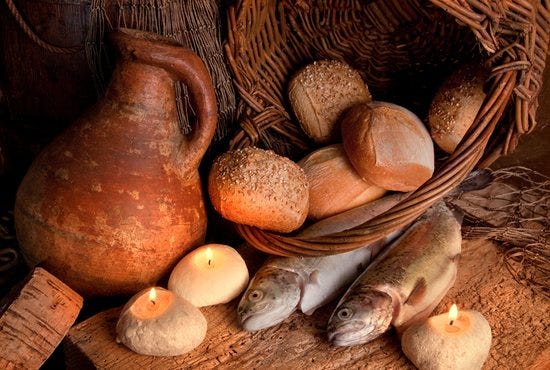Gratitude Unlocks Boundless Love
Matthew 15:29-37 reveals the boundless generosity of the divine. It speaks of the transformative power of gratitude and the awe-inspiring potential hidden within the simplest of offerings. This scripture serves as a vibrant portrayal of the divine's boundless generosity, echoing the transformative essence of gratitude and the profound potential nestled within the most unassuming offerings.
As the passage unfurls, the scene materializes against the backdrop of the Sea of Galilee. Jesus, seated upon the serene mountaintop, becomes the focal point of a gathering teeming with diverse souls seeking solace and healing. A tapestry of humanity converges, carrying with them the weight of afflictions—lame, blind, deformed, and mute—laying their burdens at the feet of the sage.
In a moment that transcends the ordinary, miraculous healings unfold. The once voiceless speak, the deformed find wholeness, the lame tread upon newfound strength, and the blind are bestowed with sight. A spectacle of divine intervention unfolds, leaving the witnesses awestruck, their reverence pouring forth in glorification of the God that permeates their existence.
Yet, beyond the marvel of physical restoration, a deeper compassion stirs within the heart of the teacher. Three days in his presence have left the multitude not just spiritually fulfilled but physically depleted. His empathy rouses a concern—a desire to nourish their bodies as he has nurtured their souls.
In the face of apparent scarcity, the disciples question the feasibility of satiating the multitude. It is here that a lesson of abundance emerges from humble origins. Seven loaves and a few fish, meager offerings in the face of a hungry throng, are presented.
With grace and gratitude, Jesus accepts these modest gifts, setting forth a chain of divine multiplication. His blessing transforms the scant provisions into an overflowing feast, abundantly sufficient to satisfy the hunger of the multitude. Each person partakes, finding sustenance not just in the physical nourishment but in the spiritual resonance of the moment.
And as the feast concludes, the remnants astonish all present—seven baskets brimming with what was initially deemed insufficient. This surplus serves as a poignant symbol, echoing the concept of divine completeness and the inexhaustible nature of generosity.
Matthew 15:29-37, beyond a mere recounting of events, offers a profound revelation. It illuminates the profound truth that within the smallest gestures of gratitude and the humblest of offerings, lies an abundance waiting to be unveiled—a testament to the boundless love and benevolence that characterizes the essence of the divine.
Lessons
Interconnectedness: The gathering of diverse individuals seeking healing signifies the interconnectedness of humanity's spiritual quests, transcending individual differences to seek solace in a unified presence.
Divine Compassion: Jesus' deep empathy and concern for the well-being of the crowd reflect the divine compassion that encompasses all beings, recognizing their needs and striving to alleviate suffering.
Transformative Healing: The miraculous healings portray the transformative power of divine intervention, offering restoration not just physically but spiritually, symbolizing the divine's ability to bring about profound inner and outer change.
Abundance Beyond Scarcity: Despite the apparent scarcity of resources, the multiplication of loaves and fish to feed the multitude showcases the mystical concept of abundance transcending physical limitations, revealing the boundless nature of divine provision.
Sacredness of Small Offerings: The utilization of meager offerings to perform a miraculous feat underscores the mystical truth that even the smallest acts of kindness and offerings, when imbued with gratitude, hold immense potential for transformation and abundance.
Completeness in Surplus: The seven baskets of leftovers signify divine completeness, indicating that what is offered in service and generosity returns in surplus, highlighting the cyclical and abundant nature of divine provision.
Divine Sufficiency: The concept of "enough" signifies the completeness found in God's nature. It emphasizes that God's compassion, care, and generosity ensure sufficiency and abundance for all.
Union with the Divine: Being in union with God is a realization of one's inherent sufficiency. It acknowledges that within this union, individuals find completeness and sufficiency, transcending material limitations.
Self-Realization: Through this union, individuals recognize their intrinsic worth and sufficiency. It fosters a sense of self-acceptance and contentment, understanding that in connection with the divine, one possesses all that is needed.
Transcendence of Limitation: Understanding God's capacity for abundance transcends the limitations of scarcity and insufficiency. It encourages a shift from a mindset of lack to one of abundance and trust in the divine provision.
Spiritual Connection: The lesson emphasizes the profound spiritual connection between individuals and the divine. It highlights the transformative power of this union, where individuals realize their inherent completeness and sufficiency in God..
May the boundless generosity
of the divine inspire our actions.
Like a beacon of light amidst darkness,
let us embrace the transformative power of gratitude
and the profound potential within small gestures.
May our compassion nourish both body and spirit,
transcending limitations to bring
abundance where there was scarcity.
Let us carry this revelation forward,
igniting kindness and generosity wherever we tread.
Matthew 15:29-37
At that time: Jesus walked by the Sea of Galilee, went up on the mountain, and sat down there. Great crowds came to him, having with them the lame, the blind, the deformed, the mute, and many others. They placed them at his feet, and he cured them. The crowds were amazed when they saw the mute speaking, the deformed made whole, the lame walking, and the blind able to see, and they glorified the God of Israel.
Jesus summoned his disciples and said, "My heart is moved with pity for the crowd, for they have been with me now for three days and have nothing to eat. I do not want to send them away hungry, for fear they may collapse on the way." The disciples said to him, "Where could we ever get enough bread in this deserted place to satisfy such a crowd?" Jesus said to them, "How many loaves do you have?" "Seven," they replied, "and a few fish." He ordered the crowd to sit down on the ground. Then he took the seven loaves and the fish, gave thanks, broke the loaves, and gave them to the disciples, who in turn gave them to the crowds. They all ate and were satisfied. They picked up the fragments left over–seven baskets full.





